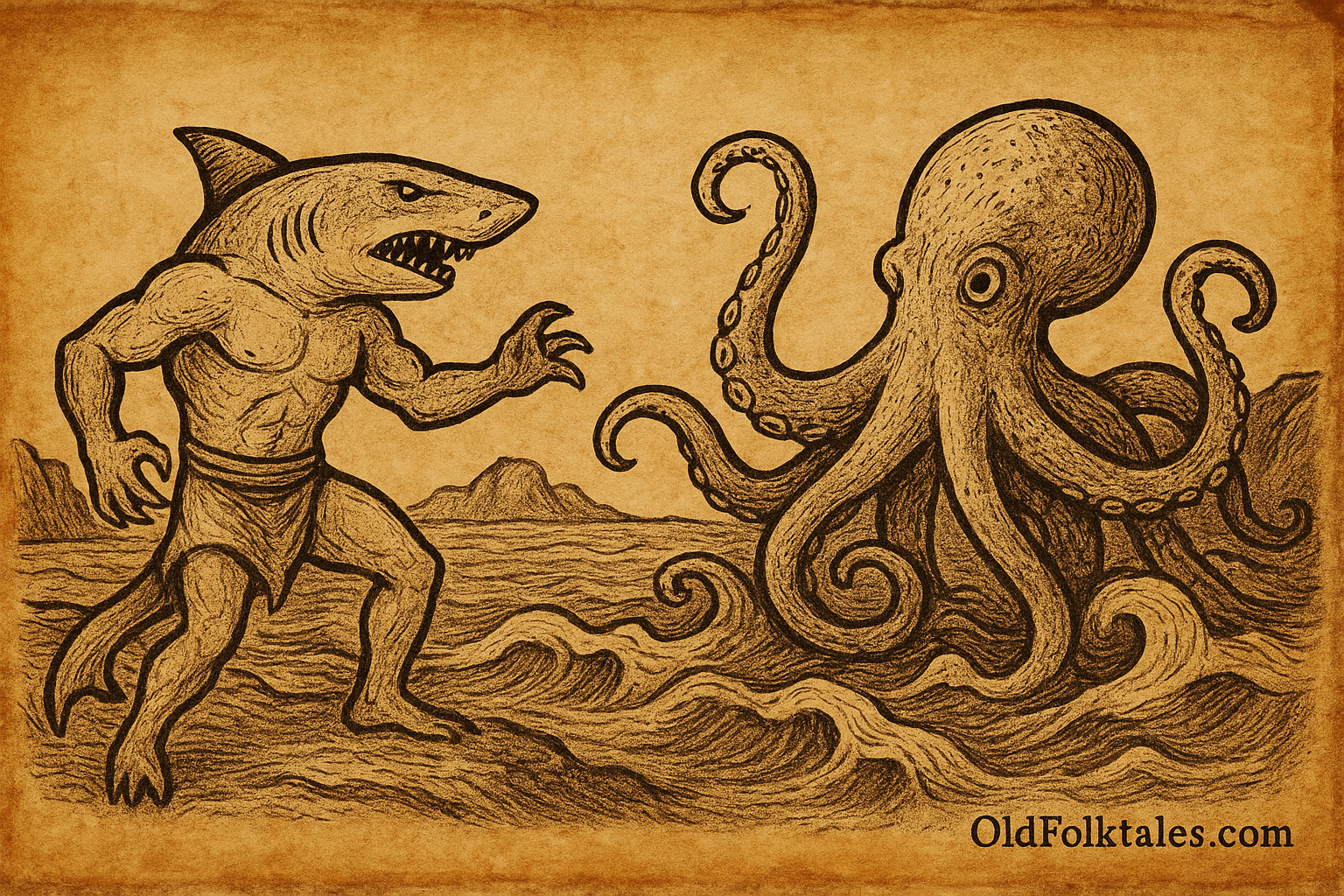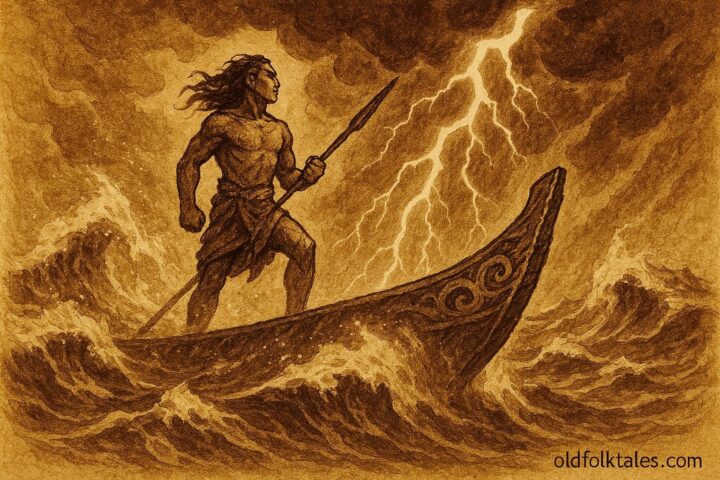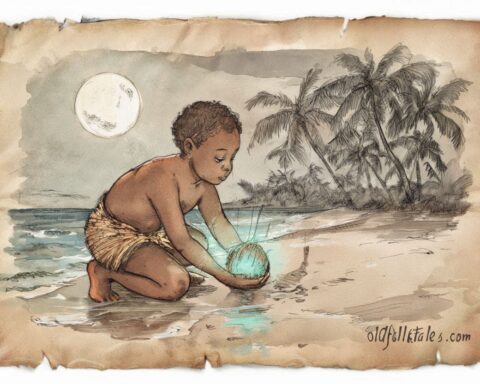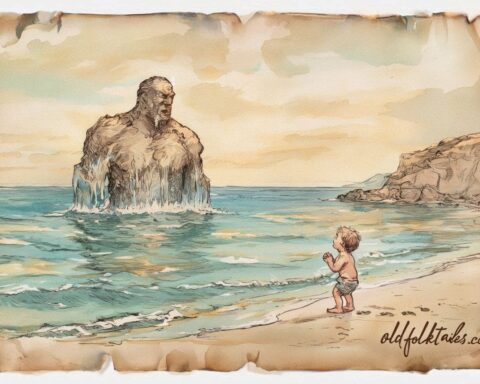In the ancient waters surrounding the islands of Fiji, where turquoise waves crashed against coral reefs and fishing canoes carved paths through endless blue, there lived a being of tremendous power Dakuwaqa, the shark-god. He was no ordinary creature of the deep. Born with abilities that transcended the natural world, Dakuwaqa possessed the gift of transformation, able to shift his form at will from fearsome shark to man, from floating log to silent stone. This power filled him with pride, and that pride made him restless.
Dakuwaqa roamed the vast ocean territories with an insatiable hunger not for fish or prey, but for conquest and dominion. He believed himself supreme among all sea beings, and he was determined to prove it. Reef by reef, channel by channel, island by island, he traveled the Fijian archipelago, challenging every guardian spirit that protected the coastal waters. Some he defeated in battle; others submitted to his will without a fight. His reputation grew with each victory, and so did his arrogance.
Click to read all Melanesian Folktales — rich oral storytelling from Papua New Guinea, Fiji, Solomon Islands, and Vanuatu
The shark-god’s muscular body cut through the water like a blade, his teeth gleaming like weapons forged from bone and rage. Wherever Dakuwaqa went, fishermen whispered his name with fear. They knew that to encounter him was to face death itself, for his moods were as unpredictable as the monsoon winds, and his strength was unmatched in all the ocean realm.
But there remained one island whose waters Dakuwaqa had not yet claimed: Kadavu, a lush jewel of land surrounded by some of the most vibrant reefs in all of Fiji. The people of Kadavu lived in harmony with the sea, their lives intertwined with the rhythms of tide and moon. They harvested fish with respect, made offerings to the spirits, and honored the sacred bond between land and water. Their island was protected not by a mere mortal guardian, but by an ancient and powerful octopus spirit a being whose wisdom was as deep as the ocean trenches and whose strength had been tested through countless generations.
When Dakuwaqa approached the waters of Kadavu, his intention was clear: he would force this island to submit to his authority, just as all the others had done. The waves seemed to sense the coming conflict, rising higher and churning with unusual violence. The octopus guardian, aware of the shark-god’s approach, prepared to defend its sacred trust.
The battle that erupted was unlike anything the islands had ever witnessed. The ocean itself became a battlefield as Dakuwaqa, in his most fearsome shark form, lunged at the octopus with snapping jaws and thrashing tail. The octopus moved with fluid grace, its eight powerful arms creating whirlpools and currents that threw the shark-god off balance. They grappled and twisted, locked in mortal combat.
Coral reefs that had stood for centuries shattered under the force of their struggle. Fishing canoes anchored near the shore were flung through the air like children’s toys, spinning end over end before crashing into the waves. The sea itself seemed to boil, frothing white and violent as the two titans clashed again and again. Fishermen fled to higher ground, watching in awe and terror as the fate of their island hung in the balance.
In some tellings of the tale, the octopus used its tentacles to seize Dakuwaqa’s mighty jaws and, with supernatural strength, pulled out the very teeth that had been the shark-god’s most feared weapons. In other versions, the clever octopus used cunning rather than brute force, entangling Dakuwaqa in its arms and dragging him into a position from which he could not escape, holding him until exhaustion and the threat of drowning forced him to surrender.
Defeated, humbled, and for the first time in his existence truly vulnerable, Dakuwaqa found himself at the mercy of the guardian he had sought to conquer. The octopus could have ended the shark-god’s life one final squeeze, and the proud wanderer would have drowned in disgrace. But the octopus guardian possessed not only strength and cunning, but also wisdom and mercy.
Instead of death, the octopus demanded an oath. Dakuwaqa, his pride shattered and his perspective forever changed, swore a sacred vow: never again would he bring harm to Kadavu or its people. He would not hunt in these waters, would not challenge the reefs, would not threaten the fishermen or their families. More than that, he would become a protector of this island the very place that had taught him the limits of his power.
From that day forward, Dakuwaqa kept his promise. The fierce conqueror transformed into a guardian deity. Fishermen and sailors of Kadavu began to honor him with offerings and prayers before venturing out to sea, showing respect to the god who now protected rather than threatened them. They observed special tabus sacred prohibitions regarding sharks, understanding that these creatures were not merely animals but manifestations of a god who had learned humility.
The tale of Dakuwaqa spread throughout Fiji, explaining why sharks commanded such respect in Fijian culture and why certain rituals must be performed before fishing. The story reminded people that even the mightiest beings could be transformed, that defeat could lead to wisdom, and that true strength sometimes meant choosing protection over conquest.
Explore tales of ancestral spirits and island creation that connect people to the land and sea
The Moral Lesson
The legend of Dakuwaqa teaches us that pride unchecked leads to downfall, but defeat can become the doorway to transformation. True power lies not in domination but in the choice to protect and serve. When we are humbled, we are given the opportunity to discover our better nature to become guardians rather than conquerors. The greatest strength is knowing when to submit, and the noblest purpose is to use our power to shield others rather than to prove our superiority.
Knowledge Check
Q1: Who was Dakuwaqa in Fijian mythology? A1: Dakuwaqa was a powerful shark-god in Fijian mythology who possessed the ability to shape-shift into different forms including a shark, man, log, or stone. He was known for his pride and fierceness, traveling throughout the Fijian islands challenging reef guardians and claiming dominion over ocean territories.
Q2: What special powers did the shark-god Dakuwaqa possess? A2: Dakuwaqa had the supernatural ability to transform his shape at will. He could shift between the form of a fearsome shark, a human man, a floating log, or a stone. This shape-shifting power, combined with his tremendous strength, made him one of the most formidable beings in Fijian ocean mythology.
Q3: What happened when Dakuwaqa challenged the guardian of Kadavu Island? A3: When Dakuwaqa attempted to conquer Kadavu, he encountered a powerful octopus guardian who defended the island. A massive battle ensued that destroyed reefs and flung canoes through the air. The octopus either pulled out Dakuwaqa’s teeth or used cunning to trap him, ultimately defeating the shark-god and forcing him to surrender.
Q4: How did Dakuwaqa transform from destroyer to protector? A4: After being defeated and humbled by the octopus guardian, Dakuwaqa swore a sacred oath never to harm Kadavu again. This defeat transformed him from a proud conqueror into a protective deity. He became a guardian of Kadavu’s waters, and fishermen began honoring him with offerings and prayers before going to sea.
Q5: What cultural practices does the Dakuwaqa legend explain in Fiji? A5: The legend explains why Fijians show deep respect toward sharks, viewing them as more than mere animals. It also accounts for specific tabus (sacred prohibitions) and ritual offerings that fishermen and sailors make before fishing or venturing into the ocean, particularly in the waters around Kadavu Island.
Q6: What is the symbolic meaning of the octopus defeating Dakuwaqa? A6: The octopus defeating Dakuwaqa symbolizes how wisdom, cunning, and protective duty can overcome brute strength and pride. The octopus represents the power of guardianship and the importance of defending community, while Dakuwaqa’s transformation illustrates that even the mightiest beings can learn humility and find redemption through defeat.
Source: Adapted from Fijian oral tradition as documented in “The Fijian myth of the greedy god Dakuwaqa” (The Kid Should See This), “Fijian myths & legends” (Fiji Journal), and Lewis Twiby’s “Myths, Legends and Faith: Dakuwaqa.”
Cultural Origin: Fijian Mythology, Republic of Fiji, South Pacific







